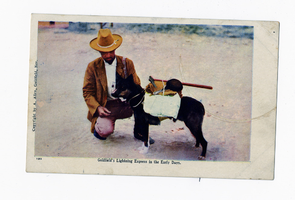Search the Special Collections and Archives Portal
Search Results
Megan Neri oral history interview, 2024 May 20
Level of Description
Scope and Contents
Oral history interview with Megan Neri conducted by Claytee D. White and Stefani Evans on May 20, 2024 for the UNLV Remembers: an Oral History of the 6 December 2023 Shootings project. In this interview, Neri shares her recollections from December 6, 2023. She was working as the Communications Director for Lee Business School and was in Beam Hall when she heard gunshots and screaming. She went to the 5th floor of the building and barricaded in an office with colleagues and students. Neri describes planning events for the Business School and assisting with campuswide commemorations to honor UNLV staff who were murdered that day. Finally, Neri shares how she is slowly recovering from the trauma of the day, and how grateful she is for fellow UNLV colleagues. Digital audio available.
Archival Collection
Collection Name: UNLV Remembers: an Oral History of the 6 December 2023 Shooting interviews
Box/Folder: Digital File 00 (Restrictions apply)
Archival Component

Carl Esteban oral history interview: transcript
Date
Archival Collection
Description
Oral history interview with Carl Esteban conducted by William Bailey on December 2, 2022 for the Reflections: the Las Vegas Asian American and Pacific Islander Oral History Project. In this interview, Esteban recalls growing up in Salinas, California in a predominantly Asian community before relocating with family to Las Vegas, Nevada in 2002. As a first generation Filipino America, Esteban's mother sacrificed her life in the Philippines to become the sole person in her family to immigrate to America. Esteban received his degree in Special Education and is currently pursuing to a master's degree in the same field. Esteban is currently a special education educator at the Yvonne Atkinson-Gates Center in North Las Vegas. Throughout the interview, Esteban discusses a wide range of topics spanning from his family migration story, his early childhood, his Filipino identity, Asian stereotypes as the model minority, and how his mentors helped shape him into the person he is today.
Text
Ingrid Ruffin oral history interview, 2024 May 16
Level of Description
Scope and Contents
Oral history interview with Ingrid Ruffin conducted by Claytee D. White and Stefani Evans on May 16, 2024 for the UNLV Remembers: an Oral History of the 6 December 2023 Shootings project. In this interview, Ruffin shares her recollections from December 6, 2023. She begins the interview discussing her childhood, attending college, and enlisting in the U.S. Air Force from 1999-2005. Ruffin then describes her journey to her current role as Associate Dean at UNLV Libraries, where she was working the day of the shooting. She remembers more than 1,000 people sheltering in the library and walking to Thomas & Mack to debrief before returning to campus and driving home. She recalls how her military training helped her remain calm through the events of that day and the next, but how the trauma broke through on Friday, manifesting as pain. Digital audio available.
Archival Collection
Collection Name: UNLV Remembers: an Oral History of the 6 December 2023 Shooting interviews
Box/Folder: Digital File 00 (Restrictions apply)
Archival Component

"Goldfields' Lighting Express in the early days.", postcard
Date
Archival Collection
Description
Image

Transcript of interview with Helen M. Baucum by William D. Marshall, February 28, 1975
Date
Archival Collection
Description
Text
H. P. Fitzgerald oral history interview
Identifier
Abstract
Oral history interview with H. P. Fitzgerald conducted by Wymon Henderson on March 14, 1981 for the Ralph Roske Oral History Project on Early Las Vegas. Fitzgerald discusses black history in Las Vegas, Nevada, school integration, and being one of the first black administrators for Clark County School District.
Archival Collection

Arsya Respati oral history interview: transcript
Date
Archival Collection
Description
Oral history interview with Arsya Respati conducted by Madison Chang on December 4, 2021 for Reflections: The Las Vegas Asian American and Pacific Islander Oral History Project. University of Nevada, Las Vegas (UNLV) student Arsya Respati shares his childhood and upbringing in Jakarta, Indonesia and educational background. He discusses his studies at the international BINUS SCHOOL Simprug in Jakarta and his immigration to the United States with his younger brother to pursue the culinary arts at the William F. Harrah College of Hospitality at UNLV. Arsya Respati talks about his relationship with his parents and their daily communication, his "aunty" who has helped him adjust to American culture and homesickness, his Muslim faith and traditions, and his employment. He also shares his views on Indonesian politics and cultural diversity, and the diversity of Las Vegas.
Text

Louise LeClair interview, March 21, 1978: transcript
Date
Archival Collection
Description
On March 21, 1978, collector Dennis Luppens interviewed Louise LeClair (born July 28th, 1910 in Mesquite, Nevada) at her home in Las Vegas, Nevada. In this interview, Mrs. LeClair discusses her family history and education in Las Vegas, Nevada. She also discusses healthcare and talks about the flu epidemic of 1918 and how it affected Southern Nevada.
Text

Interview with Donna Smith, November 4, 2006
Date
Archival Collection
Description
Text

Lisa Hank oral history interview: transcript
Date
Archival Collection
Description
Oral history interview with Lisa Hank conducted by Barbara Tabach on May 31, 2019 for the Remembering 1 October Oral History Project.
Lisa discusses her move to Las Vegas in the early 1990s from California for a job with the Las Vegas Metropolitan Police Department, and her current position as head of the Police Employee Assistance Program (PEAP). Lisa talks about the night of October 1 and the aftermath of the shooting, both in her work and personal life. She is the wife of Charles Hank III, police officer and another interviewee for the Remembering 1 October Oral History Project.
Subjects discussed include: well-being in aftermath of 1 October; PEAP preparation; healing.
Text
